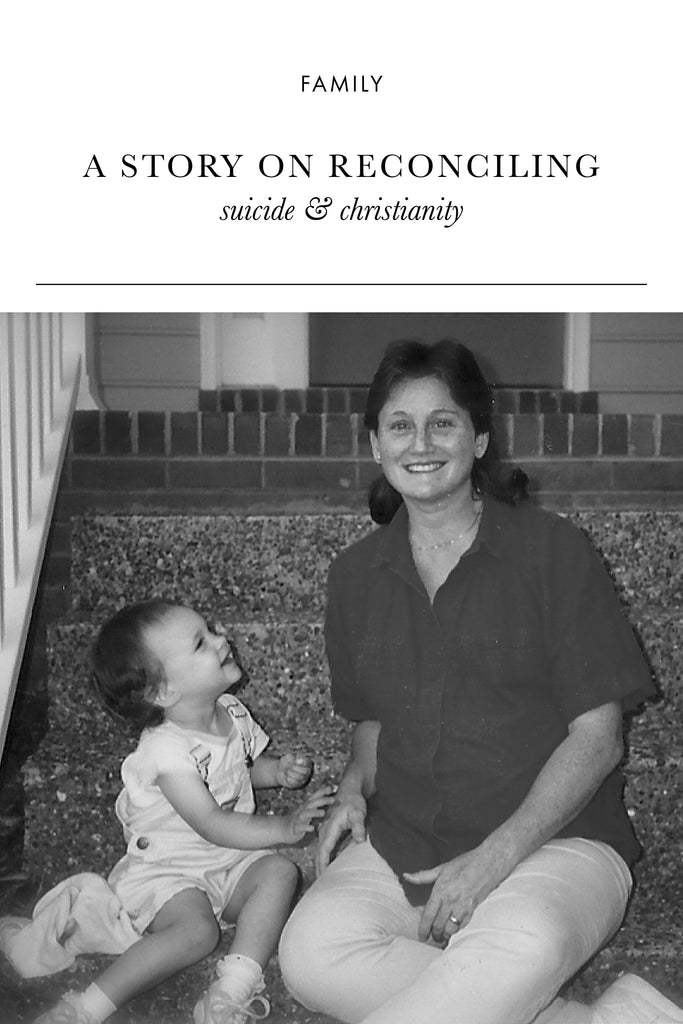
I've shared about my mom's role in the beginning of Dear Mushka, as the person who called me Mushka my whole life and who tragically died just months after my wedding day. It was in her honor that I began a blog called "Dear Mushka," which later turned into this business... but I’ve never shared much of her story or how she died.
My mom was an amazing woman and mother, she was incredibly smart with a career as an E.R. physician. She was hilarious and fun to be around and my best friend for much of my childhood.
She also suffered from mental illness and drug addiction. I’m not sure which came first, but I know she began having lots of back pain when my siblings and I were young, which led to surgeries (that she would have called unsuccessful due to the lingering pain), which led to an addiction to narcotics. I think, from there, she developed clinical depression which is common with addiction.
This was my childhood- periods of her being a present, incredible mother and periods of her sleeping months away. I’ve suppressed much of my childhood, which is part of why I’m doing counseling, but I recognize that there were years of our lives that were very unstable.
In 2010, I was a recent college graduate and newly engaged. It was then that my mom had a suicide attempt. She was found and was sent to a treatment facility, but months later—right after Robert and I got married—she tragically died by suicide.
That language is important. I used to say she “committed suicide” but I’ve grown to understand that this death, for many people, isn’t a choice. My mom didn’t choose to leave our family that she loved so deeply. She was sick. Her mind was so sick. Like cancer! And suicide took her.
I often say that her death is what catapulted me into God’s word and into a deeper relationship with Christ and it is— not just because I was broken-hearted, but because I wanted answers. I needed to know who this God was that didn’t offer my mother healing on this side of eternity. I needed to understand what God meant when He said he was "a very present help in times of trouble" (Psalm 16:1) when He appeared not to be to my mom.
When I look back at my mom’s story, I wonder where she was sinful and pridefully refused help. I wonder here she took matters into her own hands (like the excessive drug use) instead of submitting to the pain God gave her as a thorn in her flesh. I wonder where and why she forgot the Gospel? I also wonder where I’d be without this as my story. Would Dear Mushka even exist, for example?
There are days when it all seems to click and my mind processes His perfect healing of her in Heaven and His provision for me still on this side of eternity. I see experience God as my refuge and strength, a present help in times of trouble. And there are days I recognize this as a lingering issue, that comes out in my parenting and in my marriage and I go to counseling.
Ultimately, I don’t have all the answers and that’s okay. It keeps me humble. I can praise, with Job, a God who gives and who takes away. I can look at the margins in her Bible and see that Jesus was a close companion during her suffering. I can trust fully that she loved the Lord and is with him, healed and glorious. And I can thank God that He creates beauty from ashes, this business being one shining example of that.
I don't know specifically why the Holy Spirit prompted me to share this today, but I'm praying these words comfort of you with the comfort I've received from God. I want you to know that I struggle, too. I’ve experienced deep grief that lingers still, and I’ve wrestled with God. If that's your story, you aren't alone.
I also want to encourage those of you who know someone with a mental illness or have one yourself. It’s a real sickness and not something that can necessarily just be prayed away. We're doing society a disservice by simply encouraging more faith or shaming the aid of medication.
If you’re having suicidal thoughts, tell someone around you. And if you’re on the listening end, offer empathy instead of judgment. Don’t panic. Ask questions. Take it seriously. Keep showing up. Help them get help.
Thanks for being here, sisters. I love walking this side of eternity with you. xx
